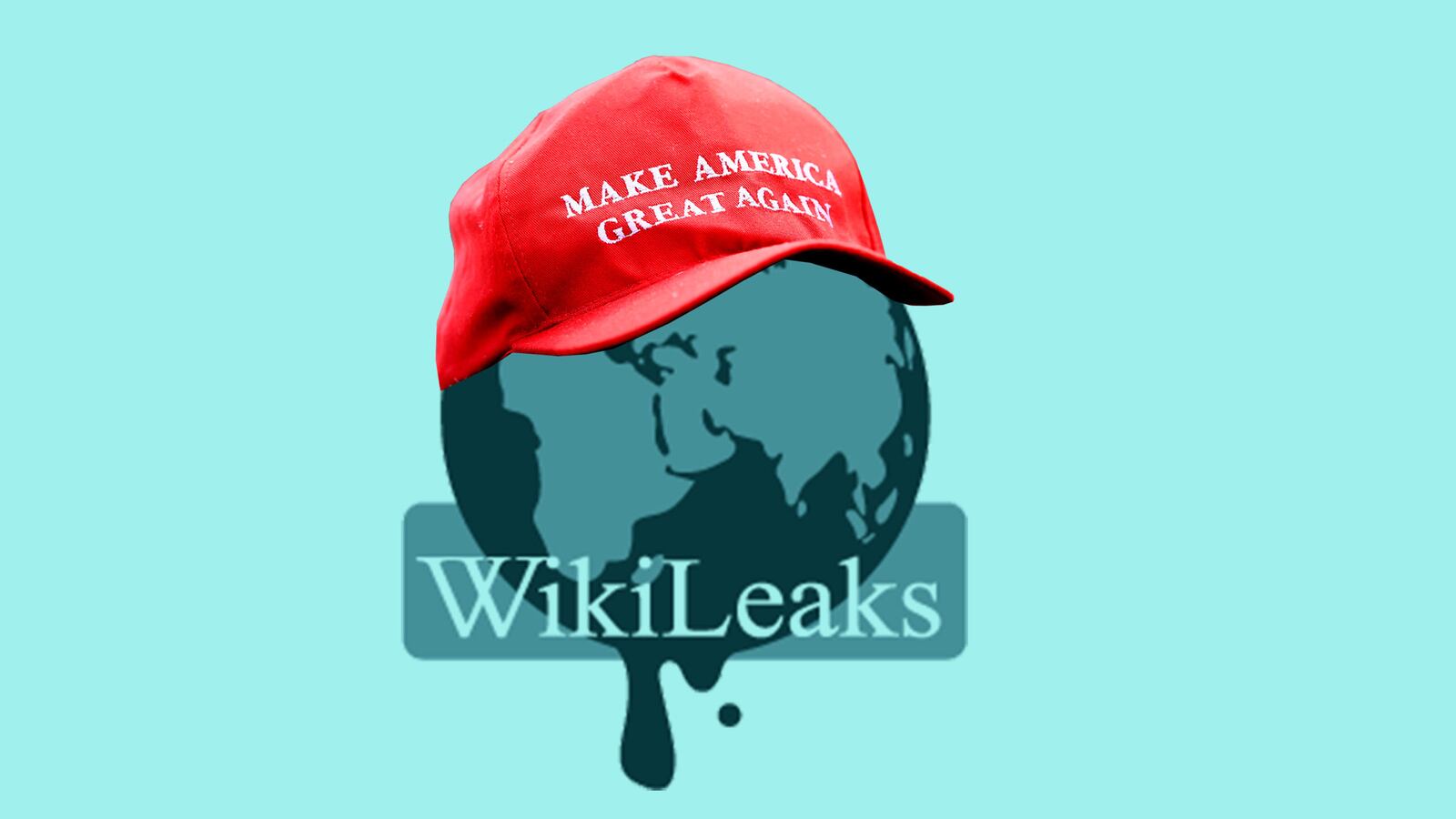Someone important in the Trump campaign was tasked with staying on top of what Roger Stone was learning from WikiLeaks about its pending released of hacked DNC and Clinton emails. Sure, Friday’s indictment told us that Stone had been allegedly having an extensive back-channel chat with WikiLeaks about its Clinton dirt but we already sort of knew that. What’s more intriguing is that multiple Trump campaign officials were aware of it and “a senior Trump Campaign official was directed” to talk to Stone about it. So who in Trumpworld was itching for WikiLeaks dirt in the summer and fall of 2016?
Several possibilities: It’s important to keep in mind that the indictment alleges Stone had different conversations with different kinds of Trump campaign associates. The first thing we know is that someone obscured by Special Counsel Robert Mueller’s use of the passive voice made it a senior campaign official’s job to check with Stone about WikiLeaks releases. But that person wasn’t the only campaign official whom Stone kept in the loop about the pending release of hacked Clinton data. The indictment makes clear that Stone was both “informed” and was “contacted by” a number of “senior Trump Campaign officials”—plural. So let’s take a look at who allegedly sought out info about future WikiLeaks dumps and where they might (or might not) fit in the indictment narrative.
Steve Bannon? If you buy the reporting out of CNBC, Steve Bannon is the “high-ranking Trump campaign official” who emailed Stone on October 4, 2016 asking about another WikiLeaks release of hacked materials. The news outlet says it confirmed that with an unnamed source and it appears that there might be something to it. The New York Times got ahold of emails between Bannon and Stone and one exchange between the two men exactly matches an email between Stone and the “high-ranking Trump campaign official” in question.
Paul Manafort? Manafort is a close friend of Stone and the two men operated a Washington, D.C. lobbying shop together in the 1980s—Black, Manafort, Stone and Kelly—so the two already had a well-established relationship. He was campaign chairman when a “senior campaign official” was directed by an unknown person to reach out to Stone about WikiLeaks. Adding to the intrigue, ABC News also reported in October that Mueller’s team questioned Manafort specifically on the subject of Stone’s conversations with WikiLeaks as part of Manafort’s plea deal.
Donald Trump Jr.? When he testified before the Senate Judiciary Committee in September 2017, Trump Jr. said he had “no idea” if Stone had tried to get Hillary Clinton’s emails, couldn’t recall having spoken to Stone at any time past 2015, and didn’t know whom Stone did speak with at the campaign. It’s also unclear why Trump Jr. would need to talk to Stone about WikiLeaks when he had his own, more direct channel to Assange via Twitter. Trump Jr. tweeted out the messages, which his legal team also turned over directly to Congress.
In those messages, Trump Jr. was very much interested in what WikiLeaks had planned for its Clinton releases. On October 3, 2016, Trump Jr. asked Assange, "What's behind this Wednesday leak I keep reading about?"—a reference to the widely anticipated next release of stolen Clinton campaign materials. That same day, according to the indictment, Stone was still trying to figure out whether Assange would release hacked Clinton campaign material on October 4 at a press conference marking the anniversary of WikiLeaks’ founding.
Peter W Smith? One of the more bizarre chapters in the hunt for hacked Hillary material featured a wealthy Republican Trump supporter named Peter W Smith. Starting around Labor Day in 2016, Smith set out on a crusade to find emails stored on Clinton’s private server when she served as secretary of state, and he reached out to myriad cybersecurity experts to help find them. Smith implied to associates that former Trump national security adviser Michael Flynn was a part of the quest, according to The Wall Street Journal. In October 2018, the Journal reported that the Special Counsel’s Office believed Smith “may have had advance knowledge” of WikiLeaks releases.
Where could he fit in with the indictment? There’s also a more nebulous description of a “supporter involved with the Trump Campaign” whom Stone talked shop with about WikiLeaks releases. The description of “a supporter involved” rather than the more frequently used “campaign official” seen throughout the indictment suggests a vaguer and less official member of the Trump orbit got a tip-off.
Like all of these possibilities, nothing is certain yet. But Stone spoke to the “supporter involved with the Trump Campaign” sometime around October 3. The description and the timeline could apply to Smith but it’s broad enough to apply to many others, too. Smith committed suicide in 2017 and cited his declining health and an expiring life insurance policy in a note left behind.
Big picture: The picture painted of the Trump campaign’s knowledge about impending WikiLeaks releases is a lot different to the one imagined by #Resistance types. Senior campaign officials allegedly had to rely on Stone to get a heads-up. The indictment also makes clear that his information wasn’t always correct in real time. In early October, Stone spent a few days fumbling around trying to figure out why his original target release date skipped and when the release would come. If Trumpworld was using Stone as a several-steps-removed intermediary, that implies that senior campaign officials weren’t receiving hacked Clinton dirt from a more direct (and reliable) source in the Russian government.






